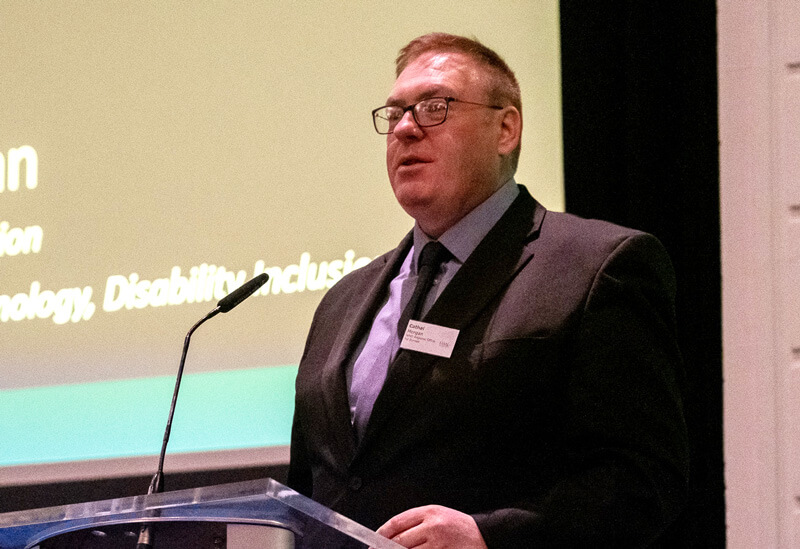
Almost 2 million people in Ireland have conditions amenable to rehabilitation
To provide Digital and Assistive Technology to help people requiring rehabilitation, the Irish health and social care system should take advantage of Ireland being a major hub for a wide variety of multi-national flagship companies in the area of Information Technology and home to one of the largest global clusters of Medical Device Industries, Dr. Cathal Morgan, Policy Advisor, WHO Regional Office for Europe and Technical Officer – Rehabilitation Health Services & Disability Inclusion told the Conference.
Based on 2019 studies, almost 2 million people in Ireland had conditions which were amenable to rehabilitation, he said.
Musculoskeletal disorders made up 69% of these conditions, sensory impairments 12%, neurological disorders 7%, chronic respiratory disease 5%, mental disorder, 5%, cardiovascular disease 4% and neoplasms 2%.
There were five main factors driving the increasing need for rehabilitation:
- Ageing -Globally, by 2050, there would be 2 billion people aged 60 and over, up from 1 billion in 2020. (WHO 2017. World Population Ageing 2015).
- Non-communicable diseases – Globally, in 2013, noncommunicable diseases accounted for two out of every three years lived with disability. (WHO 2013. Global action plan for the prevention and control of noncommunicable diseases 2013–2020).
- Communicable Diseases – Pandemic situations plus the impact of Covid 19 [including post covid conditions].
- Disability – Over one billion people – about 15% of the global population [circa 136m in WHO Euro Region] – lived with some form of disability and this number was increasing. (WHO 2011. World Report on Disability).
- Conflict situations – Tens of millions more people suffered non-fatal injuries each year.
Dr. Morgan said Assistive Technology referred to any device or system that helped to improve functional capacity of a person.
Digital Literacy was the ability to use information and communication technologies to find, evaluate, create and communicate information, requiring both cognitive and technical skills.
“In essence, assistive and digital technology allow children to learn at school, adults to work and enjoy leisure, and older people to be mobile and connected to their community.
“Assistive technology can help people see and hear better, it can help people with intellectual and cognitive disabilities understand and interact more effectively and it can support people with psychosocial disabilities to manage and work through difficult times.”
Dr. Morgan said that if Ireland was to improve access to Assistive Technology, it should ensure Assistive Technology products were safe, effective and affordable, service users and their families/carers should be involved, public awareness increased, political support garnered and stigma re use of AT combatted.
We should also invest in data and evidence-based policy decision making, invest in research, innovation and an enabling eco-system, develop and invest in enabling environments, include AT in humanitarian responses, provide technical and economic assistance through international cooperation to support national efforts and assist in the strengthening of systems-thinking orientation to reform operational delivery into a more cost effective and sustainable model.
“When scaled appropriately, this approach can help reduce direct health and welfare costs [improves quality of life experience]. The health and social care system should take advantage of Ireland being a major hub for a wide variety of multi-national flagship companies in the area of Information Technology and being home to one of the largest global clusters of Medical Device Industries.”
Dr. Morgan said Digital and Assistive Technology was the right thing to do, as it was an enabler for healthy and independent lives across the life course and the smart thing to do, as it provided an economic and social return on investment.
Digital and Assistive Technology could assist in health system reform and opportunities by assisting in the strengthening of systems-thinking orientation to reform operational delivery into a more cost effective and sustainable model. When scaled appropriately, this approach could help reduce direct health and welfare costs and improves quality of life experience.
Looking at the policy context in terms of Ireland, he said Sláintecare aimed to promote engagement and empowerment of citizens in the care of their own health. Scale and share examples of best practice and processes for chronic disease management and care of older people, encourages innovations in the shift of care to the community or provide hospital avoidance measures.
Dr. Cathal Morgan, Policy Advisor, WHO Regional Office for Europe. Technical Officer – Rehabilitation Health Services & Disability Inclusion
On a secondment arrangement from the Health Service Executive, Cathal works as a Policy Advisor to the WHO Regional Office for Europe. In this role, Cathal provides technical advisory support to WHO member states in scaling access to rehabilitation and digital/assistive technology. He also advises member states in developing and implementing disability inclusion policy solutions in health and social protection services.
Cathal has held several senior leadership positions within the Irish Public Service including as Assistant National Director of Disability Operations in the Irish health service, Director of the Homeless Agency, and National Drug Strategy Manager. He is also a member of the Board of the National Disability Authority, an independent statutory body that delivers independent research and policy advice to the Irish Government on disability matters.
Cathal is a qualified clinical psychotherapist and holds a master’s degree in clinical psychotherapy, a PhD in clinical research and a post-graduate diploma in executive leadership coaching.

